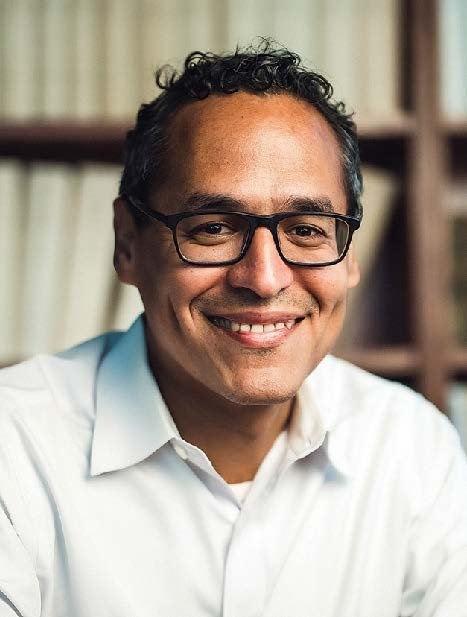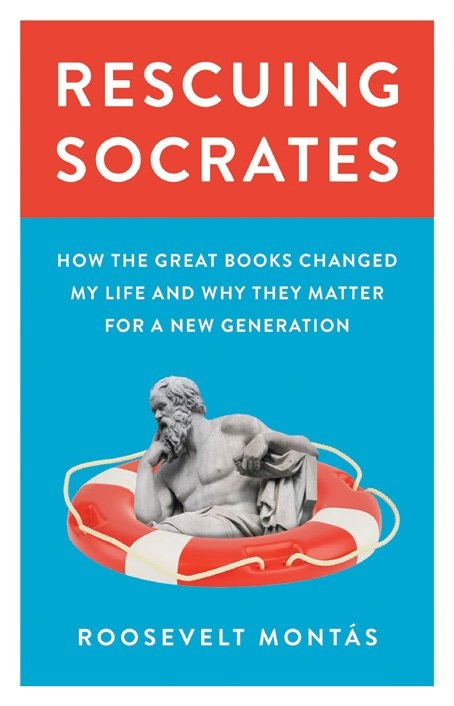Roosevelt Montás ’95 credits the liberal arts for transforming his life.
Columbia College | Columbia University in the City of New York
Roosevelt Montás ’95 credits the liberal arts for transforming his life.

Roosevelt Montás ’95, GSAS’04
INBAL SIVAN
Not so, says Roosevelt Montás ’95, GSAS’04, a former director of the Center for the Core Curriculum, who argues persuasively for the transformative nature of the liberal arts in Rescuing Socrates: How the Great Books Changed My Life and Why They Matter for a New Generation (Princeton University Press, $24.95). Montás makes his case largely by way of memoir: He immigrated to Queens from the Dominican Republic when he was 11 — a three-and-a-half-hour flight, but an “incalculable” distance — and credits the liberal arts for profoundly shaping the course of his life.
Montás is talking, of course, about the Core Curriculum, which he first encountered as an undergraduate in 1991. Montás was admitted to the College through a state program for students with “financial need and academic under-preparedness,” and went on to earn a Ph.D. in English from GSAS. He was Core director from 2008 to 2018 and is currently a senior lecturer in American studies and English.
Montás is also a founder and director of the Freedom and Citizenship Program, a partnership between the Double Discovery Center and the Center for American Studies that teaches the foundations of Western political tradition to low-income high school students. The experience, he says, continually reinforces the relevance of liberal education to students today.
“Liberal arts education equips us to live the life of freedom,” Montás told CCT. “It gives us the tools and perspectives that allow us to maximize our human potential. And it focuses on this condition of freedom, this fact that every individual has a kind of autonomy that permits us to organize our lives according to our own conception of ‘the good.’ That’s a responsibility that every individual has to fulfill.”
Rescuing Socrates is organized around meditations on four great thinkers: Saint Augustine, Plato, Sigmund Freud and Mahatma Gandhi. Montás dedicates a chapter to each, weaving discussion of their work with critique of contemporary liberal education and poignant personal reflection. The combination gives the book heft while keeping it accessible to a wider audience. (The Wall Street Journal notes its “warm, appealing narrative,” while Kirkus called it “a vigorous argument in favor of reading and discussing the canon in order to better our minds and souls.”)
Montás’s choice of authors was driven by their influence on his own intellectual development as well as how they have factored into his work as a teacher and administrator. These figures may be canonical, but more importantly, he says, they are “famously introspective, committed to the project of self-knowledge. That makes them rich grounds upon which to elaborate and illustrate what the point of a liberal education is.”
The excerpt here speaks to the allure of Socrates by way of his student Plato’s dialogues, and it comes on the heels of the anecdote that gives the book title its layered meaning: As a high school sophomore, on a winter night too cold to linger, Montás found an improbable stack of hardcover classics left out for garbage pickup; he saved two, including Plato’s account of the last days of his teacher’s life. “It is a strange stroke of fortune that Socrates should be the figure to arise from that pile of books on the sidewalk, like a genie rubbed out of a lamp,” he writes.
Asked about Socrates’s significance, Montás observes that his uncompromising approach to the pursuit of truth offers “a set of values that transcend our lives.” As for the Athenian’s effect on his teenage self, Montás calls back to the dislocation of his youth — “of being not just an immigrant who didn’t speak English, but also being poor, being from a rural mountain town and finding myself in New York City.” He was also in the grip of a religious awakening. “I was in a sense looking for salvation, and I was reading [Socrates and Augustine] to find what in them was useful to understanding my own life. And that is characteristic of the liberal education approach — where we read books not just to learn about them, but also to learn from them.”
— Alexis Boncy SOA’11

The Socrates I rescued from a pile of trash is full of romance. How could my hungry teenage heart resist him? The three dialogues in the book span the period from his trial to his execution: The Apology, the Crito, and the Phaedo. The Apology records Socrates’s defense of himself before an Athenian jury. He was brought to court, at age seventy, accused of corrupting the young and of introducing new gods to the city. He was found guilty and sentenced to death.
The next dialogue, the Crito, flows from the absurdity of the trial. Things got out of hand. No one could have possibly really wanted such an outcome. It would be ridiculous for Athens to put to death a seventy-year-old-man for engaging in the activity — annoying as it might be — that Socrates was engaged in. Socrates’s old and wealthy friend, Crito, visits him in prison, having made arrangements for his escape. Athenian authorities seem embarrassed by what’s happening and are ready to turn a blind eye if his friends were to arrange for Socrates to leave Athens. So Crito is there, with only a few days to go before the execution, ready to whisk Socrates away. But Socrates says, “No, I can’t go.” Then he argues that to run away would be to betray everything he has lived for and that his entire way of life demands that he accept the death sentence imposed lawfully by the city. It is a devastating argument that leaves Crito completely defeated. His last words in the dialogue are “I have nothing to say, Socrates.”
The Phaedo, the last dialogue in the collection, purports to be a record of Socrates’s last conversation, in which he argues, and claims to demonstrate, the immortality of the soul. The dialogue then ends with a heart-wrenching description of Socrates “calmly and easily” drinking the poison, lying down, and quietly dying: “Such was the end of our comrade,” says Phaedo, “a man who, we would say, was of all we have known the best, and also the wisest and the most upright.”
***
Socrates’s defense is simple and plain. It paints a quintessential picture of a life devoted to the pursuit of truth and virtue — what he conceives as the philosophic life. His words to the jury come in three speeches. In the first, and longest, he defends himself against the charges brought against him. He fails at this, and the jury finds him guilty as charged. According to Athenian practice, after a guilty verdict, the jury would choose between a punishment proposed by the accuser and one proposed by the accused. Socrates’s accusers propose death. The second speech of the Apology is Socrates’s counterproposal. Initially, he suggests that he be given free meals at the city’s expense, but then, at the urging of Plato and other rich friends, he agrees to a fine which they will pay for him, since he himself has no money. According to the ancient biographer Diogenes Laertius, the margin of the vote to condemn Socrates to death was larger than the one that found him guilty. His second speech, in other words, was an even bigger failure than his first. The third speech in the Apology records Socrates’s admonition to the jury after its decision to have him executed.
Socrates’s initial defense speech doesn’t dazzle. At least, it didn’t dazzle me. It didn’t have the magnanimity and passion I expected from a man in his situation. I remember thinking it was sort of half-hearted; I wanted a heroic blast, a discharge of thunder. But at times, especially early on in the speech, Socrates seems whiny and a little conceited, complaining about popular depictions of him like the one in Aristophanes’s play The Clouds, where he is viciously and hilariously mocked. His defense sometimes seems calculated precisely to turn off the jury. Such is the moment when he claims to be a “gadfly”:
Indeed, men of Athens, I am far from making a defense now on my own behalf, as might be thought, but on yours, to prevent you from wrongdoing by mistreating the god’s gift to you by condemning me; for if you kill me you will not easily find another like me. I was attached to this city by the god — though it seems a ridiculous thing to say — as upon a great and noble horse which was somewhat sluggish because of its size and needed to be stirred up by a kind of gadfly. It is to fulfill some such function that I believe the god has placed me in the city. I never cease to rouse each and every one of you, to persuade and reproach you all day long and everywhere I find myself in your company.
Really? Doesn’t Socrates see that this line of defense isn’t going to help? That he sounds arrogant and presumptuous? It’s as if Socrates has in view not the jury in front of him, but the intellectual tradition he would launch. It’s as if he is looking past his fellow citizens to a lineage of dissident intellectuals and telling them, “Your business is to irritate authorities, to challenge the status quo, to ask embarrassing and obnoxious questions of those who claim a public mandate, and to be prepared to pay the ultimate cost for doing so.” Compelling as this may sound now, it could not have landed well on the audience of the moment. Nor could it have been helpful to talk about a “divine sign,” a “voice” that since childhood had spoken to him ordering him to abstain from doing certain things like entering politics.
Despite his questionable rhetorical choices, the overall impact of Socrates’s self-defense is powerful. Its force comes upon you gradually, evenly, and you might not even notice it until it’s too late to resist.
Excerpted from RESCUING SOCRATES: How the Great Books Changed My Life and Why They Matter for a New Generation by Roosevelt Montás. Copyright © 2021 by Princeton University Press. Reprinted by permission.

Published three times a year by Columbia College for alumni, students, faculty, parents and friends.
Columbia Alumni Center
622 W. 113th St., MC 4530, 6th Fl.
New York, NY 10025
212-851-7852
cct@columbia.edu

Columbia Alumni Center
622 W. 113th St., MC 4530, 4th Fl.
New York, NY 10025
212-851-7488
ccalumni@columbia.edu